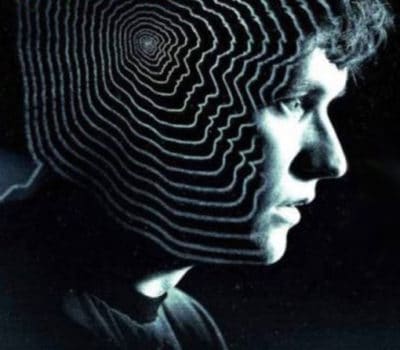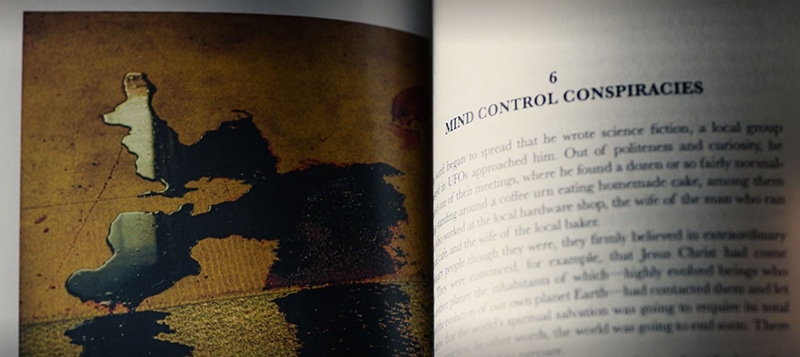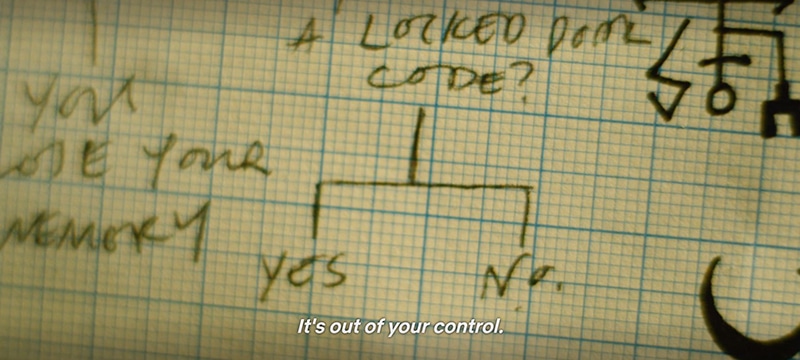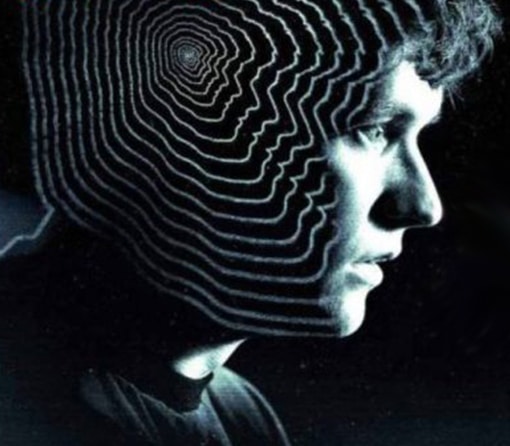Movies and TV
The Deeper Meaning of “Black Mirror: Bandersnatch”
“Black Mirror: Bandersnatch” is an interactive film that allows viewers to choose their own path. And some of them in the dark world of MK-ULTRA. Here’s a look at the deeper meaning of Bandersnatch.
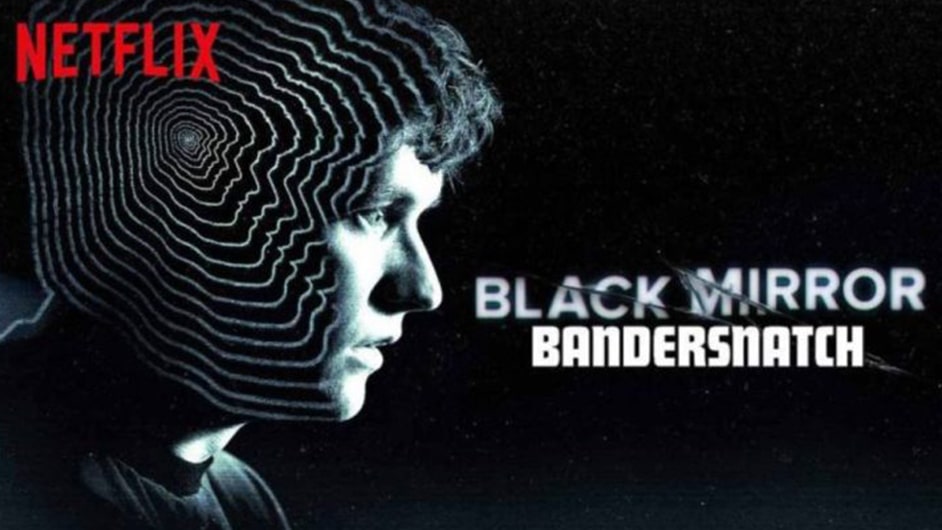
Warning: Enormous spoilers ahead!
Described as a “Netflix event”, Black Mirror: Bandersnatch is an interactive film that allows viewers to “choose their own adventure”. On several occasion during the film, viewers are presented with two options and are given 10 seconds to decide. Upon selection, the option plays out and the narrative adapts accordingly. Consequently, the choices made by the viewers lead to different scenes, story paths and, ultimately, to different endings. However, once an ending is reached, the film loops the viewers back to unselected choices, making it easy to view the entire film and analyze it as a whole.
The viewers are making the decisions for Stefan Butler, a young computer whiz who is adapting a fantasy choose-your-own-adventure book into a video game. The film appears to be heavily inspired by this 1984 BBC documentary that follows the creation of a “mega-game” named Bandersnatch by the London software company Imagine before the holiday season. That game was never released.
Black Mirror: Bandersnatch takes the context of this fascinating period of British tech history and adds a whole lot of creepiness to it. And, considering the fact that this is a Black Mirror episode – a series about the potentially perverse effects of modern technology on humanity – things get very meta, very quickly. In fact, several levels of meta end up leaving most viewers’ minds looking like this.
As Stefan attempts to create an innovative game that allows multiple narrative paths, he’s also the protagonist of an innovative film that allows multiple narrative paths. As things progress, Stefan realizes that he is not in control of his own mind – the viewer is. This realization triggers a descent into madness as Stefan begins obsessing about a specific symbol (named the “White Bear”) and a demon named Pax.
In short, the viewer controls Stefan’s mind. In shorter, that’s mind control. Appropriately enough, the film is replete with symbolism relating to MK-ULTRA and trauma-based mind control. Furthermore, in some story paths, Stefan discovers that he’s was drugged, studied and monitored since birth.
While several news sources analyzed Bandersnatch, nearly all of them missed an obvious point: It is about trauma-based mind control. From the backstory of the protagonist to the MK-symbolism peppered throughout, Bandersnatch is an “adventure” in the mind of a slave. And it all starts with the title of the episode.
Bandersnatch

Stefan’s video game is based on a book named Bandersnatch. The maze pattern at the bottom of the cover hints to MK programming. As things progress, Stefan’s game will end up reflecting his own struggle.
The book Bandersnatch and its author Jerome F. Davies are totally fictional. However, the origins of the name Bandersnatch leads us deep into mind-control lore.
Bandersnatch is the name of a fictional creature in Lewis Carroll’s 1872 novel Alice Through the Looking-Glass, the sequel to Alice’s Adventures in Wonderland.
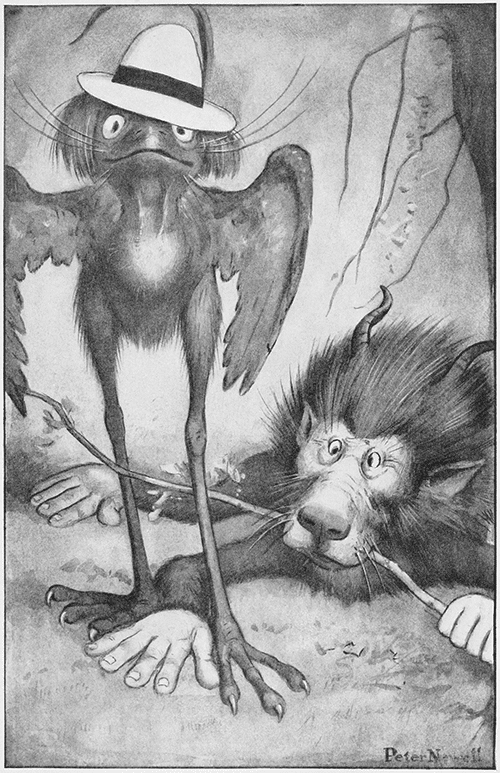
Peter Newell’s illustration of the Bandersnatch (right) – a horned lion. We’ll later see that Stefan see lions everywhere in the film.
As discussed in many articles on this site, the story of Alice in Wonderland is an actual programming script used in trauma-based mind control. The same way Alice “goes through the looking glass” to Wonderland, MK slaves are told to dissociate, mentally leaving the real world to retreat to the internal world created by the programmer. For this reason, symbolism associated with Alice in Wonderland is constantly used in mass media to illustrate mind control. Obviously, Bandersnatch is no exception. The name itself is a direct reference to Alice in Wonderland. Furthermore, Stefan even ends up looking for a white rabbit by going through a mirror (more on this later).
Early MK-Related Clues
Before learning about the dark truth about Stefan, we see several clues relating to his mind control. However, it is only on second viewing that these scenes take on their full meaning.

Stefan wakes up and takes a couple of pills. He’ll soon discover that he has been medicated his entire life.

As Stefan goes to the kitchen to eat breakfast, his father suspiciously locks the door to his study. There are some dark secrets in there.

Stefan’s father (and handler) intently puts out a cigarette in an ashtray. This gesture is seen on several occasions during the film and, every time, Stefan is bothered and disturbed by it. Is it a trigger signal? Stefan will later use this ashtray to kill his father.
As Stefan embarks in the creation of his video game for the software company Tuckersoft, he also takes interest in the dark story of the author of the book Bandersnatch.

Stefan reads a biography of the author of Bandersnatch titled “The Lives of Jerome F. Davies”. The plural “lives” alludes to several MK personas.

Stefan learns that the author was obsessing over a symbol (called the “White Bear”). After killing and decapitating his wife, Davies drew the symbol using her blood. This is reminiscent to the gruesome murders committed by the followers of Charles Manson (an MK slave/handler) who drew words and symbols on the walls using the blood of their victims.
Soon enough, Stefan finds himself obsessing over the same symbols as Davies. And the White Bear is one of them.
White Bear Symbol
In Black Mirror, the White Bear symbol has several layers of meaning. As illustrated above, it represents the branching narratives in the video game Stefan is developing. On a wider scale, it represents free will – the ability to make decisions – and, in Stefan’s case – the lack thereof. For this reason, the symbol ends up representing a higher force that is in control of Stefan’s mind.
The White Bear symbol appeared in previous episodes of Black Mirror and, every time, it refers to a “force” controlling people. Indeed, the symbol has been used to refer to government conspiracy, high-tech monitoring, mind control, and dark spiritual forces. Does this symbol represent the occult elite?
As Stefan loses his mind, he starts seeing a lion-like demon named Pax.
Pax and PACS
While watching a documentary about the life of Jerome F. Davies (the author of the book Bandersnatch), Stefan learns about Pax.
“Davies became convinced he had no control over his own fate because his wife was spiking him with psychoactive drugs at the behest of a demon called Pax, a sort of lion figure he claimed he’s seen in a vision”.
As seen above, in Lewis Caroll’s Alice in Wonderland books, Bandersnatch is a horned lion. If one goes through the many story branches of Black Mirror: Bandersnatch, lions start appearing in several significant places.
In one story branch, Colin – a “superstar” video game programmer at Tuckersoft – gives Stefan LSD to help him get out of his creative rut.

The LSD blotter given by Colin has a lion on it. It will ultimately lead Stefan to actually encounter Pax. Important fact: LSD is heavily used in MK-ULTRA.
At the height of their acid trip, Colin explains the dark implications of the game Pac-Man.
“There are messages in every game. Like Pac-Man, do you know what PAC stands for? P-A-C. Program and Control. He’s program and control. The whole thing is a metaphor. He thinks he’s got free will but really, he’s trapped in a maze, in a system. All he can do is consume, he’s pursued by demons that are probably just in his own head. Even if he does escape by slipping out on one side of the maze, what happens? He comes right back on the other side”.
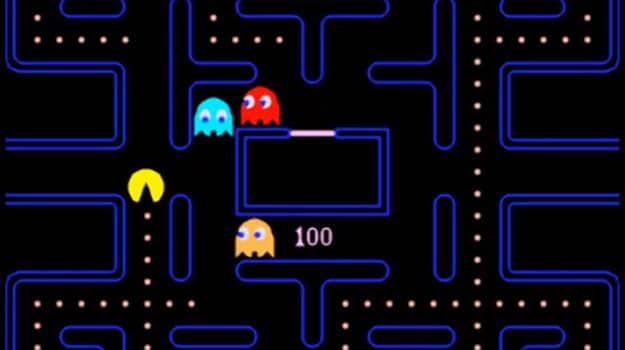
A screenshot of 1982 game Pac-Man. Colin describes it as a metaphor for Stefan’s life as an MK slave.
Not unlike Pac-Man, Stefan has to constantly consume pills to keep going. And, as his madness grows, he is also followed by demons. Actual demons.

While tripping, Colin convinces Stefan that, because there are several alternate realities, he could jump out the balcony and it wouldn’t matter. The viewer is then given the choice to have Stefan or Colin jump. If Colin is selected, he jumps out and kills himself.
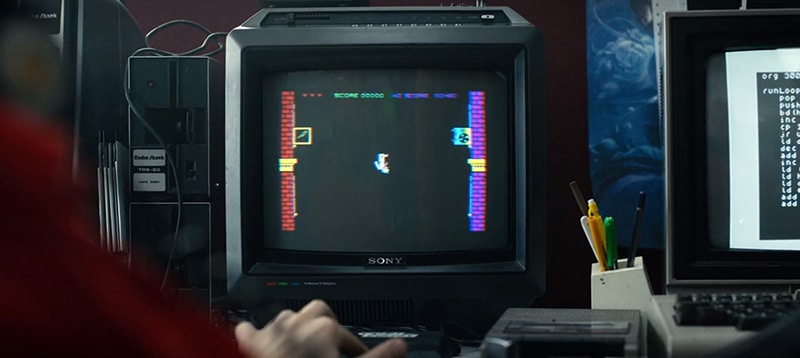
Earlier, Colin was showcasing his latest video game. The setting: A guy jumping off of a balcony. The video games in Bandersnatch foretell events to come.
After Colin’s death, Stefan leaves the apartment in a panic. However, he is stopped short by something quite scary.
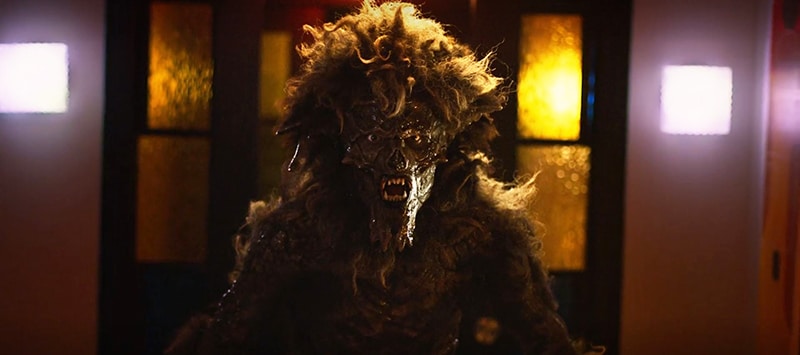
Stefan encounters a physical manifestation of Pax. This thing will reappear on several other occasions, especially when things do not go well for Stefan.
In Monarch mind control, slaves are actually assigned demons to enforce programming.
“Programming involves an organization system, established by horrendous trauma, for the alter personalities involving internal mental imagery, which is driven by demons, who provide the power. Undoing it requires an understanding of the mental processes involved, the imagery or blueprint used, and the spiritual dynamics.”
– Fritz Springmeier, The Formula to Create a Mind Control Slave
As stated above, programming involves a system established by “horrendous trauma”. If the viewers select the right options, the backstory of Stefan is revealed: He’s a product of trauma-based mind control.
Stefan Butler: MK Slave
When Stefan manages to go inside the mysterious locked room of his father, he discovers the dark truth about his life. The viewers also discover the meaning behind the symbols Stefan was obsessing about.

Stefan discovers documents about P.A.C.S. – Program and Control Study. So Colin was right. Also, notice the heraldic lion on the document – another reference to Pax.

Stefan also finds a tape entitled “Trauma Inception” which documents the trauma he was forced to live through as part of his programming.
At this point, Bandersnatch ventures deep in the world of trauma-based mind control – also known as Monarch programming. The goal of this practice is to cause slaves to dissociate from reality as a coping mechanism to extreme trauma. Once dissociated, slaves become extremely suggestible and easy to reprogram.

Stefan’s therapist (who ends up being part of the mind control system) tells him that he is starting to dissociate.
Towards the beginning of the film, Stefan’s therapist insists that he discusses the death of his mother at a young age – a traumatic event that deeply affected the rest of his life. Stefan claims that his mother died because of Rabbit – his favorite toy.
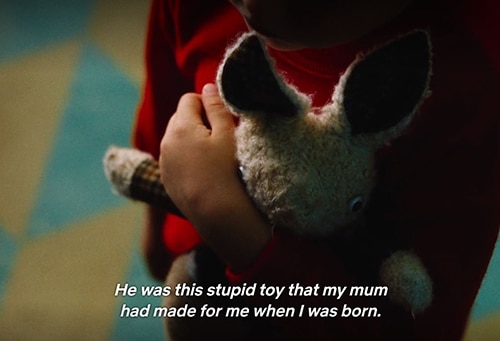
Stefan’s mother died in a train wreck. She missed the train she usually takes because Stefan could not find Rabbit and would not leave the house without him, causing her to take the next train that would end up crashing.
So the “trauma inception” was caused by a white rabbit. In Alice in Wonderland, Alice is lured to the looking glass by a white rabbit.

Stefan goes “through the looking glass” to relive the past and recover Rabbit. The theme of the White Rabbit leading towards dissociation is at the core of mind control symbolism and is constantly found in MK-themed mass media programs.
The White Rabbit is a programming figure for Alice In Wonderland Programming who will allow you to go to otherwise inaccessible places for adventure. He represents the master. The White Rabbit is an important figure to the slave.
– Ibid.
When Stefan watches the “Trauma Inception” tape, he discovers the truth about his mother’s death.

Stefan’s father laces his food with drugs. In actual MK programming, drugs are used to increase suggestibility and to amplify trauma.
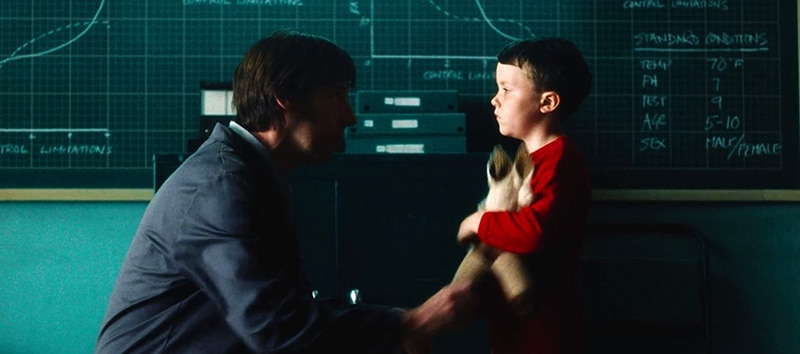
His father forcibly removes Rabbit from Stefan. Tearing apart children from their beloved toys and pets is another trauma-inducing technique.

Stefan is blindfolded and taken to his “room” which is actually a studio. His mother (an actress) is about to enter the room and announce that they need to leave to take the train.
With Stefan’s backstory, Bandersnatch covers some of the core principles of trauma-based mind control. The omnipresence of Pax and the White Bear indicate the pervasiveness of the programming that controls all aspects of his life.
This leads us to wonder: If Stefan is an MK slave and that he’s not in control of his fate, what does that makes us, the viewer? Answer: The handler. Indeed, as the story progresses, Stefan becomes aware of the fact that he is controlled by the choices made by the viewer and he attempts to resist them. But that doesn’t work.
At a critical moment in the film, the viewer is presented with two options: To kill Stefan’s father or to back off.

Earlier in the film, Stefan’s video game presented the same exact two options: “Back Off” or “Kill Agent”. Also, the figure looks suspiciously like Stefan’s father. Once again, a video game foretells events to come.
Depending on the choices the viewer makes, one can end up viewing wildly different endings. In one ending, Stefan goes back in time, embarks with his mother on the train and dies with her. In another one, Stefan discovers that he’s in a Netflix series and things get weird and even more meta. However, in most endings, Stefan ends up either creating a badly rated game and/or in jail.
Is there a happy ending somewhere in there? Not really. It is all very depressing. However, there is a path that allows Stefan to complete his video game and to get a 5/5 rating. The path: Stefan has to kill his father and chop up his body. After completing this gruesome task, Stefan appears to be at peace with himself and manages to create the perfect game. However, shortly after that, he gets arrested and his game gets taken off the shelves.

Stefan displays his father’s head in his room along with the White Bear symbol drawn in blood. The curse of Jerome F. Davies continues on.
Did Stefan get rid of his MK programmer? Or did he lose his mind and kill his own father? It’s your choice. Or is it?
In Conclusion
As highlighted in previous articles on this site, mass media has taken a specific direction in the past few years. Indeed, nowadays, most entertainment seems to be dark, sinister, depressing, and laden with fear and paranoia. Also, entertainment is increasingly replete with imagery and storylines relating to Monarch mind control -as if there was an attempt to normalize it. Netflix, the streaming service that is now at the forefront of popular culture, has been hard at work producing content that fits this agenda. In the past months, I’ve explored the MK symbolism of the Netflix series Stranger Things and the occult messages in Chilling Adventures of Sabrina. Black Mirror: Bandersnatch is yet another entry in this growing library of agenda-friendly content on Netflix.
However, contrarily to other series available out there, Bandersnatch ventures in the uncharted territory of interactive entertainment. Instead of simply viewing MK-related “entertainment”, the viewers actively take part in it. In fact, the viewers end up playing the role of the MK handler. And, like actual MK handlers, the viewers can order Stefan to kill himself or to kill others. One could argue that giving viewers this little power-trip over an MK slave makes the entire world of mind control seem less horrifying and even “entertaining”.
However, since we’re dealing with Black Mirror, we need to take another step back and see the meta going on here. As the viewers bask in the god-like feeling of deciding Stefan’s fate, they are also being carefully guided by the narrative. Furthermore, all the while, the viewers are monitored and analyzed by Netflix. Indeed, there are already several articles out explaining the data-mining of decisions made by viewers.
In short, the true subject of the “Program and Control Study” is not Stefan … it’s you.
P.S. If you appreciated this article, please consider showing your support through a small monthly donation on Patreon. If you prefer, you can also make a one-time donation here. Thank you.
- Laser beam able to destroy targets at speed of light is tested from British army vehicle for first time
- New Fountain in Vienna Shows What Ruling Oligarchy Think of Us and Celebrates How They've Warped and Ruined Us
- Cartoon Network 'Mighty Magiswords' creator Kyle Carrozza arrested on child p**n charges
- Biden said this … and then something happened.
- BlackRock linked firm, Austin Private Wealth (APW), shorted Trump stock shortly before shooting.
- They don't even hide anymore …
- Global IT meltdown show perils of cashless society
Get an e-mail notification as soon as a new article is published on The Vigilant Citizen.
-

 Movies and TV2 months ago
Movies and TV2 months agoThe Eurovision 2024 Finale Was Basically a Demonic Ritual
-

 Pics of the Month2 months ago
Pics of the Month2 months agoSymbolic Pics of the Month 05/24
-

 Latest News3 months ago
Latest News3 months agoBeyond Rap Beef: Kendrick Lamar’s Dark Accusations Against Drake (Including Sex Trafficking)
-

 Movies and TV3 months ago
Movies and TV3 months ago“American Horror Story: Delicate” and its Messages About Hollywood’s Occult Underbelly
-

 VC Resources1 month ago
VC Resources1 month agoThe True Meaning of the Inverted Cross and Why Mass Media Lies About It
-

 Latest News3 weeks ago
Latest News3 weeks agoBiden’s Debate Performance Was Shocking Proof That He’s Merely a Puppet. Who Actually Runs the Country?
-

 Latest News2 months ago
Latest News2 months agoBilderberg 2024 or How the Elite Subverts Politics, Technology, Big Pharma and the Media
-
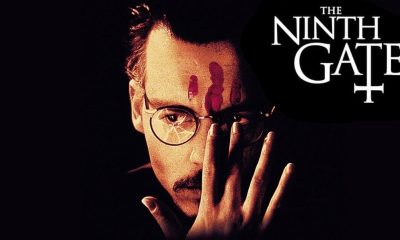
 Movies and TV1 month ago
Movies and TV1 month agoThe Much-Overlooked Symbolism in Roman Polanski’s “The Ninth Gate”

